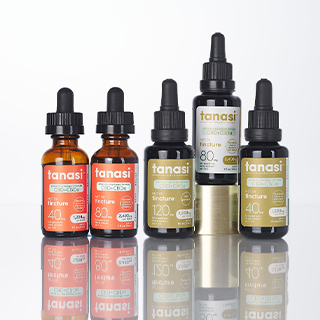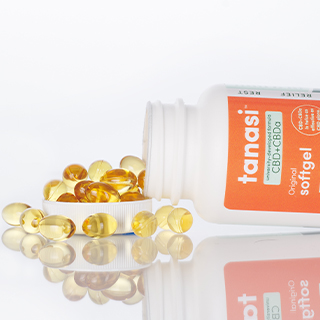CBD Effects on Cortisol
Posted on August 17th, 2020
Referred to as the stress hormone, cortisol is normally released when the body feels stressed. This important hormone plays an essential role in a variety of physiological processes and is therefore necessary for our wellbeing.
However, abnormally high or low cortisol levels can lead to a variety of health conditions, some of which may be harmful. As such, maintaining balanced levels can be essential for our health.
The fast-paced nature of modern living has resulted in a situation where many people are faced with constant stress. CBD may have properties that help you keep your cortisol levels from spiking, thereby helping manage the symptoms of associated health conditions.
Before we dive into the effects of CBD on cortisol, let’s look at what cortisol is and how it affects the body.
What Is Cortisol?
Produced in the adrenal glands, cortisol is one of the steroid hormones. Its link with stress response is the main reason why the gland is referred to as the stress hormone. However, it is important to note that cortisol is more than a stress hormone; in fact, this hormone is essential for staying healthy. The adrenal glands, pituitary gland, and hypothalamus regulate the secretion of cortisol in the body.
It is important to note that cortisol levels in the body vary over the course of the day; spiking in the morning when we need to bounce out of bed and decrease as evening approaches. A cortisol test conducted by a medical professional can help you ascertain whether you have high, normal, or low levels of the hormone.
Cortisol receptors are present in most of the cells in the body. In turn, this means that the hormone plays a role in a variety of important bodily processes. From formulating memory, and regulating the salt and water balance in the body to regulating blood sugar to the reduction of inflammation and regulation of blood pressure and metabolism. This hormone plays an important role in a variety of essential biological processes.
As a catabolic, cortisol also plays a role in regulating how your body breaks down proteins, lipids, and carbohydrates.
At this point, it is clear to see just how important cortisol is when it comes to keeping the body healthy.
Effects of Cortisol in the Body
The effects of cortisol in the body vary with the level of the hormone released into the blood. This means that the effects of normal levels of cortisol vary from those of high and low levels.
As previously mentioned, normal cortisol levels help boost your health. Overall, maintaining normal levels of this hormone is essential in facilitating the normal functioning of the body.
 Effects of High Cortisol Levels
Effects of High Cortisol Levels
Stress normally leads to a spike in cortisol levels in the blood. One of the main reasons for this is that cortisol helps with the fight or flight response to stress. To help the body deal with mental or physical stress, cortisol helps boost muscle tension, heart rate, blood pressure and respiration, and blood glucose levels. In a further bid to supply the body with what it needs to deal with stress, this hormone can also shut down any bodily processes that are not deemed to be essential during times of stress, like reproduction and even digestion.
While a spike in cortisol levels in times of mental or physical stress can be beneficial, helping the body access all the energy it needs to facilitate the fight or flight response; consistently high levels of the hormone in the body can lead to a variety of negative health effects and serious health conditions. This is usually the case when the body is forced to deal with chronic stress from the many worries that might fill our heads from day-to-day.
What If High Cortisol Levels Persist?
Having consistently high levels of cortisol in the body can lead to a variety of chemical changes. These changes may cause a variety of diseases. For starters, cortisol, in a bid to ensure survival can lead to a slowed metabolism, as the body tries to survive in periods of perceived “scarcity”, thus resulting in a reduction of the rate at which fat is burned for energy.
Consistently high levels of cortisol can also lead to frequent cases of indigestion. This is because the hormone interrupts the digestive process as well as the absorption of nutrients.
Overall, the effects of consistently high cortisol levels have been linked to the development of what is referred to as the metabolic syndrome. This term refers to insulin resistance, elevated blood pressure, and increased cholesterol. These conditions are a precursor to a variety of harmful diseases, including type II diabetes.
High cortisol levels are also associated with memory issues, depression, anxiety, and in women, changes in sexual libido and menstrual cycle. Cushing syndrome is caused by consistently high cortisol levels in the blood linked with the growth of non-cancerous tumors in the adrenal or pituitary glands.
Effects of Low Cortisol Levels
Addison disease, or primary adrenal insufficiency, is a condition that comes about as a result of abnormally low cortisol levels. The adrenal glands, located just above the kidneys can be damaged by primary adrenal insufficiency, a rare autoimmune disease.
Some of the main symptoms of this condition include skin changes, loss of muscle, mood swings, and weight loss. While these symptoms may start slowly, they are potentially life-threatening.
Now that you have a clear idea of what cortisol is as well as a comprehensive description of its many function and effects, including negative ones, read on to find out the effects of CBD on this important hormone.
A Brief Recap on CBD
Cannabidiol (CBD) is one of the many active cannabinoids found in cannabis plants. CBD oil, derived from hemp plants, is normally rich in CBD; and has a very low THC (Tetrahydrocannabinol) content – below 0.3 percent according to the law. THC is the compound that is responsible for the psychoactive effects of marijuana. Over the last few years, a lot of research has been conducted on CBD’s many potential health benefits. This cannabinoid may help manage pain, symptoms of anxiety, and inflammation.
To provide its numerous potential health-boosting effects, CBD interacts with the body’s endocannabinoid system (ECS). The ECS is made up of CB1 and CB2 receptors distributed all over the body. This network of receptors plays a vital role in a variety of physiological processes. These may include but are not limited to mood, appetite, metabolism, and immune function among others. More importantly, the ECS is also thought to help regulate the production of cortisol.
 How Might CBD Impact Cortisol?
How Might CBD Impact Cortisol?
Reduced Production of Cortisol
According to one 1993 study, CBD interferes with cortisol production. As such, CBD might act as an anti-catabolic. An anti-catabolic compound helps prevent the breakdown of muscle mass within the body. Prolonged levels of cortisol in the blood might be linked to a loss of tissue proteins. This means that CBD may help eliminate the negative effects of high cortisol levels by reducing production of this hormone.
In addition to reducing cortisol production, and its associated negative effects, CBD may also help reduce symptoms of anxiety and stress as well.
Antioxidant Properties
When the body experiences stress, it increases the risk of oxidative damage. This means that the number of free radicals in the body may increase. These free radicals cause tissue damage. CBD’s potential antioxidant properties may help protect the body from these tissue-damaging free radicals.
Better Sleep?
With the help of CBD, you may experience improved sleep at night, after a stressful day. As previously mentioned, cortisol levels in the blood naturally spike in the morning and reduce significantly at night. However, for those suffering from chronic high levels, going to sleep can be quite a challenge. This is because their body is in a constant state of fight or flight.
Increased cortisol levels may also be linked to more frequent waking throughout the night. One study found that those who took 300-600mg of CBD had lower levels of cortisol in their body, which may lead to improved sleep. Taking a dose of CBD in the evening might help reduce cortisol levels in the blood. In turn, it may help you to relax and fall asleep more easily.
Symptoms of Hormonal Changes in Women
In women who are going through stress and anxiety caused by hormonal changes resulting from high cortisol levels, CBD may be able to help. With this natural compound, you may experience improved sleep and/or weight management.
Summary
Cortisol is one of the most important hormones in the body. Secreted in the adrenal glands, this hormone plays an important role in a variety of essential bodily processes. However, consistently high cortisol levels in the blood, caused by chronic stress, can lead to a variety of negative health effects. Some of these effects may include high blood pressure, compromised immunity, insulin resistance, and increased cholesterol among other life-threatening conditions.
CBD is an anti-catabolic that may help regulate the production of cortisol through its interaction with the endocannabinoid system. This regulation might help to ensure that normal levels are maintained in the blood. If you want to get the best results from CBD use, it is recommended that you look for high-quality CBD products.
Before you start using CBD it’s important to consult with your physician. This is especially important if you have any underlying health conditions or are taking any medication. While CBD has little to no side effects, CBD may interact with certain medications.






